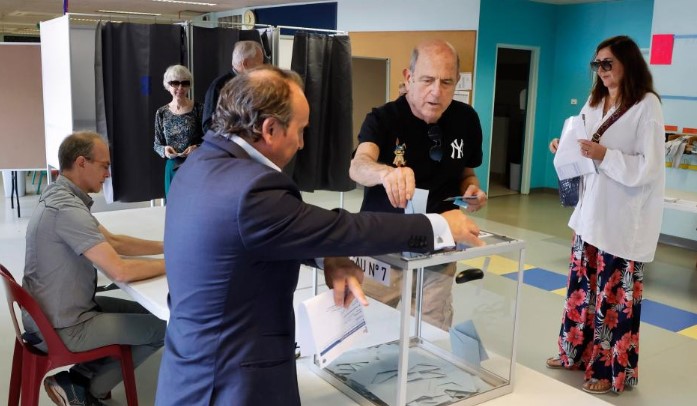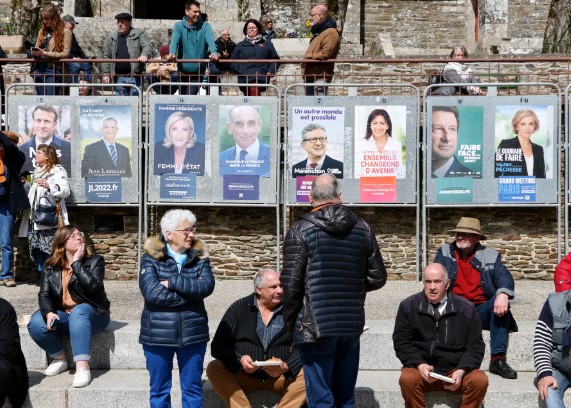In a pivotal outcome from the French legislative elections, a loose coalition of leftist parties has emerged with the highest number of seats following a decisive second round of voting. This election, which concluded on Sunday, July 7, 2024, has notably prevented France’s far-right from gaining power, yet no singular political entity or coalition has clinched a definitive majority.
You Can Also Read: WHAT MBAPPE URGES TO FRENCH ELECTORATE AMID ‘CATASTROPHIC’ RESULTS?
The New Popular Front (NFP), a coalition encompassing leftist and environmental factions, has garnered the largest share of seats as projected by polling data. However, their tally of 188 falls short of the requisite 289 needed to secure an outright majority in the National Assembly. This leaves the political landscape in a state of flux, poised for potential alliances and negotiations to shape the path forward.
Centrist Coalition Emerges as Potential Path Forward
This electoral twist deals a significant blow to the far-right National Rally (RN) party, which initially appeared poised to dominate but faced a formidable challenge after strategic collaborations between the NFP and President Emmanuel Macron’s Ensemble bloc aimed at consolidating an anti-RN vote. Projections indicate the RN trailing behind both the NFP and Ensemble, positioning none of these blocs alone in a position to independently form a governing majority. Cooperation and coalition-building among various factions now loom large as essential strategies for advancing legislative agendas.
In the aftermath of the inconclusive legislative elections, the absence of a clear majority among the three leading blocs has left the nation with a hung parliament, necessitating the formation of a coalition government through strategic alliances or negotiations between political factions.
Analysts anticipate that President Emmanuel Macron’s Ensemble alliance, comprising centrist parties, will seek to forge a coalition with more moderate elements of the left-wing New Popular Front (NFP), such as the Socialists and Greens. This approach appears to exclude any potential collaboration with Jean-Luc Melenchon’s far-left France Unbowed party, which Macron has consistently distanced himself from throughout the election campaign, portraying it as a polarizing force akin to the far right.

French Parliamentary Elections 2024
- New Popular Front (NFP): 182 seats
- Macron’s Ensemble Alliance: 163 seats
- RN and Allies: 143 seats
RN’s Growth: From 8 seats in 2017 to 125 seats in 2024
Central to the potential coalition negotiations is Macron’s controversial pensions reform, implemented in 2023, which raised the state pension age from 62 to 64—a policy vehemently opposed by the left bloc. Rainbow Murray, a politics professor specializing in French politics at Queen Mary University of London, suggests that this issue could become a significant sticking point in coalition talks, as Macron is likely to resist any demands to roll back this reform.
Technocratic Government Looms as Macron Seeks Stability
The prospect of failing to reach an agreement presents unprecedented challenges for France, as constitutional constraints prevent Macron from calling new parliamentary elections for another 12 months. Prime Minister Gabriel Attal’s resignation, tendered on Monday morning, marks the beginning of a caretaker phase until a new government is formed.
Under the constitution, Macron holds the authority to nominate a candidate to form a government, subject to a confidence vote in the National Assembly, scheduled to convene for 15 days starting July 18. The president’s strategy may involve courting Socialists and Greens from the leftist alliance to forge a center-left coalition aligned with his own bloc, potentially isolating France Unbowed—a tactic aimed at consolidating sufficient parliamentary support.
Government Formation Challenges
- Constitutional Limitation: Macron cannot call new elections for 12 months if no coalition agreement is reached.
- Caretaker Phase: Prime Minister Gabriel Attal resigns; caretaker government until new formation.
- Nomination Process: Macron nominates PM, subject to National Assembly confidence vote from July 18.
- Coalition Strategy: Potential center-left coalition formation with Socialists and Greens to isolate France Unbowed.
- Internal Alliance Stability: No current signs of fractures within the NFP despite external pressures.
However, despite speculations, there are currently no indications of an imminent fracture within the New Popular Front alliance. Another scenario under consideration is the formation of a technocratic government tasked with managing day-to-day affairs without pursuing significant structural changes, although its viability hinges on securing parliamentary backing, which remains uncertain.
Surprise Win Leaves French Politics in Limbo
Following a dramatic week of political maneuvering, the French political landscape has dramatically shifted. Initially poised for historic gains, the far-right National Rally (RN) seemed on the brink of forming France’s first far-right government since World War II after leading the first round of voting.

However, strategic withdrawals by over 200 left-wing and centrist candidates in the second round consolidated the anti-RN vote, proving decisive. This tactical alliance propelled the New Popular Front (NFP), a diverse coalition from the extreme left to moderates, to secure the largest share of seats in the National Assembly with 182. President Emmanuel Macron’s centrist Ensemble alliance, trailing significantly after the first round, made a remarkable recovery to capture 163 seats, while the RN and its allies, despite their strong start, finished with 143 seats.
The RN’s anticipated triumph envisioned as a pinnacle for its anti-immigrant agenda, ended in disappointment as the party slipped to third place. Nonetheless, their performance is notable: from just eight seats in 2017 to 89 in 2022, and now 125, making RN the largest individual party in the National Assembly.
Challenges Ahead: Can the Left Stay United?
In a swift transformation of French politics, the New Popular Front (NFP) has emerged as the largest bloc in parliament, potentially positioning itself to lead the country. Named in tribute to the historic Popular Front of 1936, which thwarted far-right ambitions, the NFP’s recent electoral success mirrors its predecessor’s achievement.
Despite achieving its initial aim, the coalition’s future unity remains uncertain. Comprising diverse parties—from far-left France Unbowed to Socialists, green Ecologists, and center-left Place Publique—the NFP lacks a cohesive voice. Each party celebrated independently, underscoring underlying divisions.
The NFP’s ambitious agenda, including raising the minimum wage and reversing pension reforms, faces challenges. These clash with EU fiscal rules and France’s deficit concerns, potentially sparking conflicts on economic and foreign policies.
Following France’s unprecedented parliamentary elections, the task of forming a viable coalition government now rests on President Emmanuel Macron, with the New Popular Front (NFP) emerging as the largest bloc in the National Assembly. Jean-Luc Mélenchon, a key figure within the leftist coalition, has urged Macron to appoint a prime minister from the NFP, emphasizing the need to respect the electorate’s mandate without compromise. Despite Mélenchon’s candidacy, his polarizing stance may complicate efforts to secure broader support. Other potential contenders include François Ruffin of France Unbowed, Boris Vallaud from the Socialist Party, and nonpartisan Laurent Berger, yet the left bloc has not yet proposed a definitive leader.
Article 49.3 in Focus
The current French political landscape marks a departure from historical norms. Unlike previous parliaments with divided leadership, today’s absence of a dominant party necessitates innovative governance approaches. Managing potential gridlock, Article 49.3 of the constitution offers a key recourse, allowing the prime minister to pass legislation without a vote, yet subject to confidence challenges. Macron utilized this provision notably for pension reform, highlighting its role amid fractured parliamentary dynamics.
Looking ahead, Macron’s presidency faces renewed scrutiny and challenges. While his term extends to 2027, the success of the leftist alliance in this election signals a potential erosion of his authority, particularly in shaping domestic policies. Speculation now surrounds the possibility of Macron interpreting July 7th election results as a vote of no confidence, potentially triggering a snap presidential election to reaffirm his mandate.


